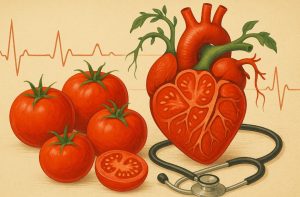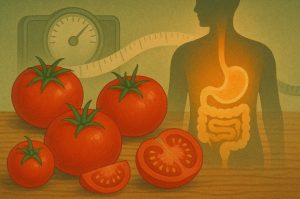What if one simple ingredient could boost your heart health, improve your skin, aid digestion, support your immune system, and even lower your risk of chronic diseases like cancer? Surprisingly, the humble tomato does all of this and more. Though often treated as a vegetable, the tomato is a fruit that brings powerful nutritional benefits to any plate.
Originating from South America, tomatoes have been a dietary staple for centuries. They are incredibly versatile and come in various colours like red, yellow, green, orange, and even purple, each packed with essential nutrients and unique antioxidants. But what really makes tomatoes so beneficial to human health?
What Nutrients Are Found in Tomatoes?
Tomatoes are low in calories but high in vital nutrients. Composed of about 95% water, the remaining 5% consists mostly of carbohydrates and fibre, making them light yet satisfying. Here is a detailed nutritional breakdown per 100 grams of raw tomato:
| Nutrient | Amount |
| Calories | 18 kcal |
| Water | 95% |
| Carbohydrates | 3.9 g |
| Sugars | 2.6 g |
| Fibre | 1.2 g |
| Protein | 0.9 g |
| Fat | 0.2 g |
| Vitamin C | 13.7 mg |
| Vitamin K1 | 7.9 mcg |
| Potassium | 237 mg |
| Folate (Vitamin B9) | 15 mcg |
| Lycopene | 2573 mcg |
This mix of vitamins, minerals, and plant compounds contributes to tomatoes’ wide-ranging health benefits.
How Do Tomatoes Promote Heart Health?

Heart disease remains one of the leading causes of death worldwide, making preventative nutrition more important than ever. Tomatoes support cardiovascular health in several ways. Lycopene, the antioxidant responsible for the tomato’s red pigment, has been shown to lower LDL (bad cholesterol) and improve vascular function.
In addition, tomatoes are high in potassium, which plays a crucial role in blood pressure regulation. Vitamin B-complex, vitamin E, and flavonoids found in tomatoes further enhance cardiovascular protection by reducing inflammation and oxidative stress.
Clinical research suggests that people with higher blood levels of lycopene tend to have a lower risk of stroke and heart disease. Incorporating tomatoes into your diet may help lower your risk of these conditions over time.
Can Tomatoes Help Prevent Cancer?
Tomatoes have been widely studied for their potential role in cancer prevention, particularly due to their high lycopene content. Observational studies have linked tomato-rich diets to a reduced risk of prostate, lung, colon, and breast cancers.
Lycopene is a powerful antioxidant that neutralises free radicals—unstable molecules that can damage cells and lead to cancer development. Tomatoes also contain other bioactive compounds like beta-carotene and chlorogenic acid, which may work synergistically with lycopene to combat carcinogenesis.
Although more high-quality human trials are needed, current research supports tomatoes as part of a diet focused on reducing cancer risk.
Do Tomatoes Boost the Immune System?
A strong immune system is essential for fighting off infections, and tomatoes can help strengthen your body’s defences. Vitamin C, a well-known immune booster, is found in abundance in tomatoes. This vitamin promotes the production and function of white blood cells, which are critical in defending the body against pathogens.
In addition to vitamin C, lycopene also plays a role in immunity by protecting immune cells from oxidative damage. Foods high in lycopene have been associated with lower incidences of infections and improved immune response.
Tomatoes also contain folate and vitamin A, which support the production of healthy cells and tissues, further bolstering immunity.
Are Tomatoes Good for Skin and Eye Health?
Tomatoes are rich in nutrients that benefit both skin and vision. Lycopene has been shown to help protect the skin from harmful UV rays. In one study, participants who consumed tomato paste daily experienced significantly fewer sunburns compared to those who didn’t. This suggests lycopene helps protect skin cells from damage caused by sun exposure.
Vitamin C in tomatoes supports collagen production, which improves skin elasticity and texture. Additionally, the presence of lutein and zeaxanthin—carotenoids found in tomatoes—helps protect the eyes from blue light emitted by screens and may reduce the risk of age-related macular degeneration.
These benefits make tomatoes an excellent choice for those looking to support healthy skin and eyes through diet.
Are Tomatoes Better Eaten Raw or Cooked?
The nutritional benefits of tomatoes can vary depending on how they’re prepared. Raw tomatoes offer high levels of vitamin C, which can be lost during cooking. However, cooking tomatoes increases the availability of lycopene, making it easier for the body to absorb.
The heat breaks down the tomato’s cell walls, allowing lycopene to be more bioavailable. Pairing cooked tomatoes with healthy fats like olive oil can increase absorption up to four times. Therefore, for maximum benefit, it’s best to include both raw and cooked tomatoes in your diet.
How Do Tomatoes Improve Digestion and Support Weight Loss?

Tomatoes are high in fibre and water content, both of which support a healthy digestive system. The insoluble fibres found in tomato skin add bulk to stool and promote regular bowel movements.
Their high water content aids in hydration and helps prevent constipation. Fibre also contributes to feelings of fullness, making tomatoes helpful for appetite control and weight management. As a low-calorie food, they can be consumed in generous portions without concern for weight gain.
What Other Health Conditions Can Tomatoes Help With?
The benefits of tomatoes extend beyond commonly discussed areas. Here’s how they may help with other conditions:
- Lung health: Antioxidants like lycopene and lutein can protect lung tissues, especially in smokers or people with asthma.
- Oral health: Lycopene may reduce gum inflammation and protect against diseases like gingivitis and periodontitis. However, tomatoes are acidic, so brushing teeth should be delayed after consumption.
- Blood vessels: Tomatoes may support healthy circulation by improving blood vessel elasticity, reducing clot formation, and lowering cholesterol.
Emerging evidence also suggests that tomatoes may reduce post-exercise inflammation and muscle damage, helping athletes recover more quickly.
What’s the Difference Between Fresh and Processed Tomatoes?
Both fresh and processed tomatoes have nutritional advantages. Fresh tomatoes are rich in vitamin C and retain most water-soluble nutrients. In contrast, processed products like tomato paste, sauce, and juice often contain higher concentrations of lycopene.
However, commercial processing can strip away some vitamins, and added salt or sugar in products like ketchup may reduce overall health benefits. Always check labels and choose low-sodium, sugar-free options where possible.
What Are Some Healthy Ways to Enjoy Tomatoes?

Tomatoes can be incorporated into meals in countless ways. A few popular and nutritious options include:
- Caprese Salad: Combining tomatoes with mozzarella and olive oil boosts lycopene absorption.
- Homemade Marinara Sauce: Cooking tomatoes increases lycopene availability.
- Fresh Salsa: A healthier alternative to sugar-laden sauces.
- Grilled or Roasted Tomatoes: Adds depth of flavour while retaining antioxidants.
Are There Any Risks or Side Effects of Eating Tomatoes?
Tomatoes are generally safe for most people, but there are a few considerations:
- Their acidity may cause discomfort for those with acid reflux.
- Tomato allergies, though rare, can occur, particularly in people allergic to grass pollen or latex.
- The acid in tomatoes can erode tooth enamel, so it’s best to rinse your mouth with water and wait 30 minutes before brushing after eating them.
FAQs About Tomatoes
Can tomatoes reduce inflammation?
Yes, the antioxidants in tomatoes, especially lycopene can help combat inflammation, which is linked to many chronic diseases.
Are canned tomatoes unhealthy?
Not necessarily. Canned tomatoes retain high levels of lycopene but may have added salt or sugar. Choose unsalted and BPA-free cans.
Is it okay to eat tomatoes every day?
Yes. Daily consumption can be beneficial, provided you don’t have an allergy or a condition aggravated by acidic foods.
How can I maximise lycopene absorption?
Cook tomatoes and pair them with healthy fats like olive oil. This combination significantly increases lycopene uptake.
Do tomatoes help with high blood pressure?
Yes. The potassium in tomatoes helps lower blood pressure, making them heart-friendly.
Should I peel tomatoes before eating?
The skin contains a lot of fibre and nutrients. Unless advised by a doctor, eating the skin is beneficial.
Do tomatoes lose nutrients when stored in the fridge?
Yes. Cold storage can diminish both the flavour and some nutrients. Store them at room temperature for best results.
READ MORE:






